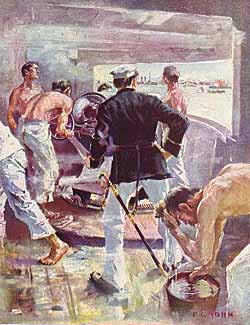44d. The Spanish-American War and Its Consequences

Americans aboard the Olympia prepare to fire on Spanish ships during the Battle of Manila Bay, May 1, 1898.
The United States was simply unprepared for war. What Americans had in enthusiastic spirit, they lacked in military strength. The navy, although improved, was simply a shadow of what it would become by World War I. The United States Army was understaffed, underequipped, and undertrained. The most recent action seen by the army was fighting the Native Americans on the frontier. Cuba required summer uniforms; the US troops arrived with heavy woolen coats and pants. The food budget paid for substandard provisions for the soldiers. What made these daunting problems more managable was one simple reality. Spain was even less ready for war than the United States.
Battle of Manila Bay
Prior to the building of the Panama Canal, each nation required a two-ocean navy. The major portion of Spain's Pacific fleet was located in the Spanish Philippines at Manila Bay. Under orders from Assistant Secretary of the Navy Theodore Roosevelt, Admiral George Dewey descended upon the Philippines prior to the declaration of war. Dewey was in the perfect position to strike, and when given his orders to attack on May 1, 1898, the American navy was ready. Those who look back with fondness on American military triumphs must count the Battle of Manila Bay as one of the greatest success stories. The larger, wooden Spanish fleet was no match for the newer American steel navy. After Dewey's guns stopped firing, the entire Spanish squadron was a hulking disaster. The only American casualty came from sunstroke. The Philippines remained in Spanish control until the army had been recruited, trained, and transported to the Pacific.
Invading Cuba
The situation in Cuba was far less pretty for the Americans. At the outbreak of war the United States was outnumbered 7 to 1 in army personnel. The invading force led by General William Shafter landed rather uneventfully near Santiago. The real glory of the Cuban campaign was grabbed by the Rough Riders. Comprising cowboys, adventurous college students, and ex-convicts, the Rough Riders were a volunteer regiment commanded by Leonard Wood, but organized by Theodore Roosevelt. Supported by two African American regiments, the Rough Riders charged up San Juan Hill and helped Shafter bottle the Spanish forces in Santiago harbor. The war was lost when the Spanish Atlantic fleet was destroyed by the pursuing American forces.
Treaty of Paris
The Treaty of Paris was most generous to the winners. The United States received the Philippines and the islands of Guam and Puerto Rico. Cuba became independent, and Spain was awarded $20 million dollars for its losses. The treaty prompted a heated debate in the United States. Anti-imperialists called the US hypocritical for condemning European empires while pursuing one of its own. The war was supposed to be about freeing Cuba, not seizing the Philippines. Criticism increased when Filipino rebels led by Emilio Aguinaldo waged a 3-year insurrection against their new American colonizers. While the Spanish-American War lasted ten weeks and resulted in 400 battle deaths, the Philippine Insurrection lasted nearly three years and claimed 4000 American lives. Nevertheless, President McKinley's expansionist policies were supported by the American public, who seemed more than willing to accept the blessings and curses of their new expanding empire.






